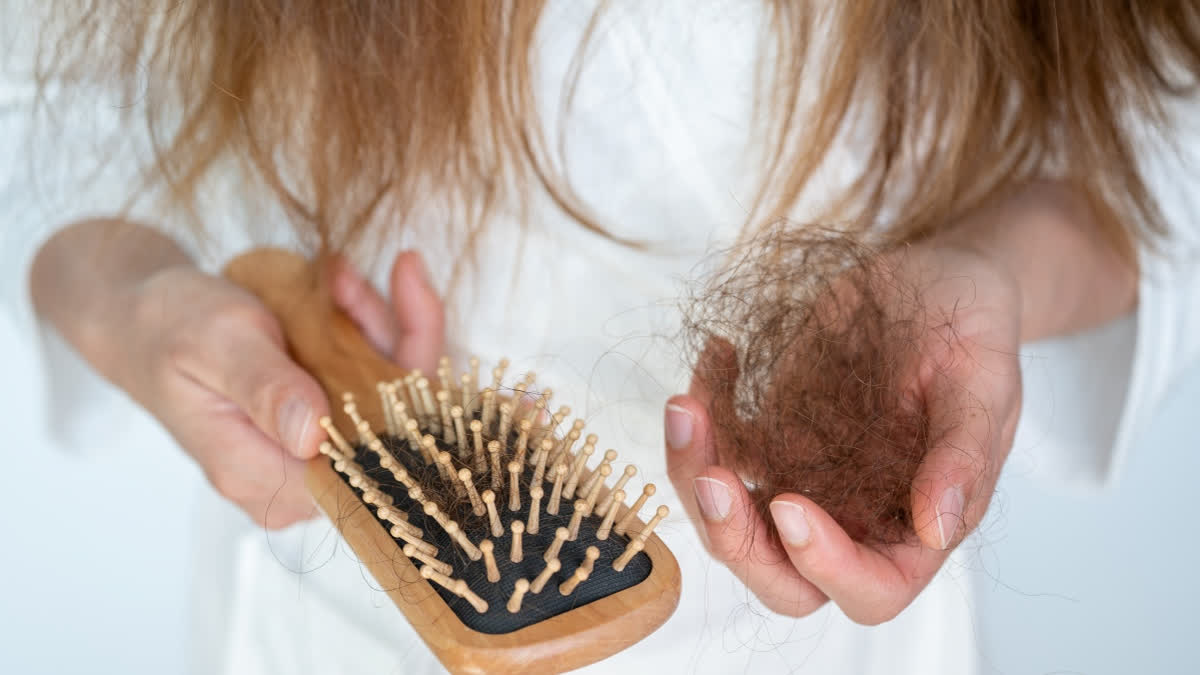Srinagar: Imagine running your fingers through your hair, only to notice more strands falling out than usual. It's frustrating, and often concerning. While many factors contribute to hair loss, one lesser-known yet major cause is iron deficiency. Iron produces haemoglobin, which helps deliver oxygen to hair follicles. And when the body lacks enough iron, hair growth can slow down, which can lead to thinning of hair and excessive shedding. Dr. Shazia Jeelani, Associate Professor in the Department of Dermatology at GMC Srinagar confirms that "Iron deficiency can cause hair loss".
Talking to ETV Bharat, Dr. Jeelani says that the average human scalp contains one to one and a half lakh hairs, and it is typical for 50 to 100 of those hairs to fall daily. "Hair loss is concerning and needs prompt treatment if it surpasses 100 strands," says Dr. Jeelani.
According to a study conducted in India, about 50 per cent of men and 40 per cent of women experience hair loss by the age of 50. Dr. Jeelani shares that scarring and non-scarring alopecia are most common among people. "In scarring alopecia, the hair roots are destroyed, preventing any regrowth. In non-scarring alopecia, however, the roots remain healthy, allowing the possibility of hair regrowth," explains the dermatologist.
A growing concern among teenagers
In the last few years, teenagers aged between 15 to 18 are experiencing hair loss. "The reasons for excessive hair loss vary and may include lifestyle factors, personal or genetic predispositions, and health conditions. One of the most common causes is androgenic alopecia (hormonal baldness), which is prevalent in men and relatively rare in women," says Dr. Jeelani. She further explains that hormonal imbalances such as those caused by Polycystic Ovary Syndrome (PCOS), thyroid, or natural hormonal changes can also contribute to hair loss in young women. Additionally, hair loss can also result from certain medications or treatments.
"The most common among these are chemotherapy and radiotherapy for cancer patients. A weakened immune system can also lead to hair loss, which can be managed with regular treatment. Some fungal infections or conditions like severe dandruff can further contribute to hair loss. Moreover, individuals experiencing health issues or mental stress may notice increased hair loss, though this typically subsides once the underlying issue is resolved," Dr. Jeelani elucidates.
Nutritional deficiencies
A recently done survey found that the number of people experiencing hair loss is increasing in Kashmir due to Iron deficiency. "Not only young adults but even children may suffer from hair loss due to nutritional deficiencies. A lack of essential nutrients such as zinc, vitamins, and proteins negatively impacts hair health and contributes to hair loss," explains the doctor.
She advises adopting certain measures for better hair care and protection. For instance, young people should avoid using hair dryers frequently and should cover their heads when exposed to dust and dirt to prevent hair from drying out. She also recommended avoiding keeping hair loose all the time or tying it too tightly in a ponytail; instead, it should be properly secured. "Frequent hairstyling and excessive use of hair gels or sprays for cosmetic purposes can also contribute to hair loss," she warns.
Talking about the treatment, Dr. Jeelani stresses that the underlying cause of hair loss can further determine the treatment strategy. "Prompt action can help stop additional hair loss. Effective therapies are now available thanks to advances in medical research. Hair transplants may not be necessary if treated early," says Dr. Jeelani as we sign off.
Read More:



